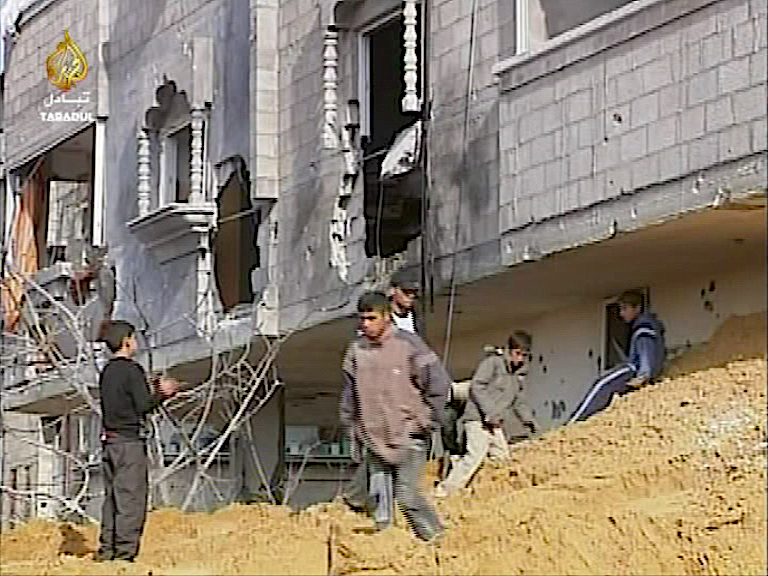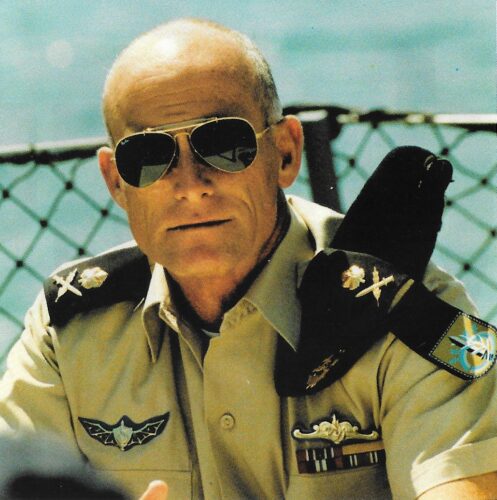It seems now light years away from when Israel worried about the international reaction to killing Gazan civilians, as Joe Lauria reported in this interview with an ex-Israel Navy commander and Shin Bet chief in 2012.
“Israel has been working on strategies to overcome this difficulty [of evading the laws of war] since its first major bombardment of Gaza in late 2008, after the siege was introduced. A unit in its attorney general’s office was charged with finding ways to rewrite the rules of war in Israel’s favour. Israel’s concerns seem quaint now – a sign of how far it has already shifted the dial on international law,” writes Jonathan Cook in an article republished today from Declassified U.K. on Consortium News.
In 2012, when the article below was written, President Barack Obama publicly urged Benjamin Netanyahu, then and now the Israeli prime minister, not to send ground troops into Gaza. We’ve heard no such word from Joe Biden. This article was also written a decade before the most extreme right wing government in Israel’s history came to power, which is looking very differently on the laws of war. In the interview, the former Naval commander and Shin Bet chief admits and regrets that Israel had supported the creation of Hamas 30 years ago.

Still shot from video footage filmed on the 18th day of the War on Gaza (Jan. 13, 2009) showing the destruction sustained from Israeli-Palestinian clash in the area. (Al Jazeera English/Wikimedia Commons)
By Joe Lauria
Huffington Post
Nov. 21, 2012
A former commander-in-chief of Israel’s Navy said Israel was hesitant to launch a ground war in Gaza after learning a painful lesson four years ago about the diplomatic consequences of killing Palestinian civilians.
Ami Ayalon said the harsh international reaction to Israel’s military conduct in Gaza in Operation Cast Lead in 2008-2009 led chastised Israeli leaders to reevaluate how to conduct the present offensive.
“I believe that we learned something from Operation Cast Lead,” Ayalon told me in an interview. “The war of today is not won on the battlefield but victory is achieved in the eyes of spectators all over the world.”
This is why Israel is being more careful to avoid civilian casualties this time and why he believes ground forces shouldn’t be used because civilian deaths would then “obviously” increase.
He said there’s a political reason too. “If we use our ground forces, we are perceived as invaders and once we are invaders Hamas becomes the national liberator… and not a terrorist organization. This is not in our interests.”
So far more than 150 Palestinians have been killed in Gaza since Operation Pillar of Defence began on Nov. 14 (2012).
A U.N. report following Cast Lead accused Israel of committing war crimes in Gaza. Israel angrily rejected the report and the lead author, South African jurist Richard Goldstone, later disavowed it. But its three other authors did not.
Israel readied 75,000 troops to invade Gaza and Israeli Prime Minister Benjamin Netanyahu threatened to send them in. Khaled Meshal, the Hamas leader, at a press conference in Cairo on Monday dared Israel to do it, vowing heavy casualties for Israeli soldiers.
President Barack Obama and U.N. Secretary General Ban Ki-moon both pressed Netanyahu not to launch a ground war.
More than 1,000 civilians in Gaza were killed in Cast Lead, which included an Israeli ground invasion. Similar numbers could be expected if Israel Defense Forces went in again, said Ayalon, who is also a former Labour Party MP and ex-director of Shin Bet, Israel’s domestic security service.
Ayalon says Israel’s air war was justified because of Hamas’ rocket attacks. But he said military action and Israel’s blockade of the territory are ultimately failed strategies because so many new Hamas weapons replaced those destroyed four years ago.
“The blockade doesn’t work,” Ayalon said. “Hamas, as of at least a week ago, was much more powerful than they were four years ago so I’m not sure the blockade is the right way to deal with this threat.”
Ayalon believes Israel’s attack on Gaza was a just war that any Israeli government would prosecute to protect its citizens in the south.
“But I think finally we will never win a war only by using our military capabilities,” he said. “Yes we know how to fight, but this is not the only language we speak. We must speak the language of diplomacy and there is a huge opportunity here.”
The Palestinian Authority’s bid to become a non-member state of the United Nations in a vote slated for Nov. 29 is that opportunity, Ayalon said. The Palestinians have more than the 97 votes required in the General Assembly to win the U.N. upgrade.
But Israel has threatened to withhold tax revenue from the PA if they go ahead with the vote. Ayalon instead has a radical idea: Israel, on two conditions, should support the U.N. bid.
One condition is that PA President Mahmoud Abbas begin on Nov. 30 for six months to negotiate borders based on the 1967 lines with land swaps. The other is that during the talks Abbas promises not to bring war crimes charges against Israel in the International Criminal Court, which the Palestinians could join as a U.N. non-member state.
A separate peace with the PA-ruled West Bank would isolate Hamas, Ayalon said. “We are fighting Hamas, not Palestinian society,” he said. Once Palestinians in Gaza see the benefits of a West Bank deal with Israel, their support for Hamas will erode, he believes.
“When the Palestinians elected Hamas it was not because they believe in fundamentalism,” he said, but because of Fatah’s corruption and a belief that Israel only understands force.
“To separate the Palestinian people and Hamas, in the long run if we show a viable [peace] process I believe the Palestinians in their next elections would vote against Hamas,” he said. Abbas, who has renounced violence, can only gain if the process is active, he said.
Whether Netanyahu is willing to negotiate is a different matter, Ayalon acknowledged, but said he had compromised in the past. “If it is clear to Netanyahu that in order to face Iran Israel will have to pay in Palestinian coin, I am not naïve, but I believe Bibi Netanyahu would do it.”
Admits Israel Supported Hamas
Ayalon conceded that Israel was today paying a price for a misguided policy of supporting Hamas two decades ago at the beginnings of the radical Islamic group as a counterweight to the secular Palestine Liberation Organization.
“The idea was that religious people couldn’t care less about a nation-state and might be the opposition to the national movement of the PLO, which we saw then as our major threat,” Ayalon said. “This is why we saw this element within the Palestinian society as a positive element.”
“Of course, we could not predict history and shape history by ourselves,” he said. Hamas later also turned to national independence as a priority over Islamism, he said.
Ayalon, in step with the official Israeli position, blamed Hamas for starting the present conflict. He said the trigger for Israel’s aerial and naval bombardment came after a steady build up of rocket fire into southern Israel led to a missile striking an Israeli Jeep on Nov. 10, wounding four soldiers.
But the cause of the conflict is in dispute. Two days before, on Nov. 8, Israeli helicopter gunships made an incursion into the Gazan village of al-Qarara, northeast of Khan Yunis, killing 13-year old Ahmed Abu Daqqa, who was playing football in front of his house, according to the Palestinian Centre for Human Rights.
The rocket that wounded the Israeli soldiers was in apparent retaliation.
“Of course I know all these events, but the idea that we should try to find what was the exact event that created this wave of violence … it’s beyond a specific case,” Ayalon said.





This is an important article so that folks don’t forget all the context and recent history of the issues, thanks Joe.
Of course, the MassMediaCartel, msm, MiniTrue or whatever we want to call it, always shoves context and the past down the “memory hole”. That way people are more likely to believe whatever they are told, no matter how incongruous,d or even irrational it is.
From the article:
“More than 1,000 civilians in Gaza were killed in Cast Lead, which included an Israeli ground invasion.”
From AP today:
“The Gaza Health Ministry said Friday that roughly 1,800 people have been killed in the territory — more than half of them under the age of 18, or women. Hamas’ assault last Saturday killed more than 1,300 Israelis, most of whom were civilians, and roughly 1,500 Hamas militants were killed during the fighting, the Israeli government said.”
So already nearly 5000 people have lost their lives unecessarily. And according to Israel, they are only just beginning.